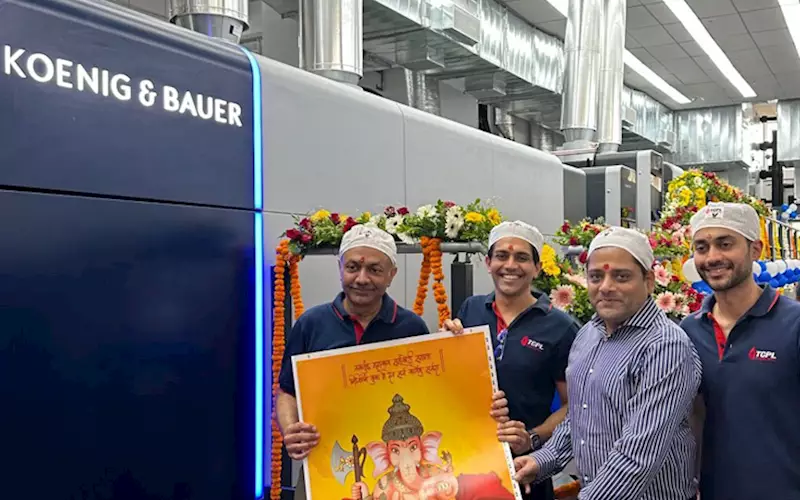TCPL buys eight-colour Koenig & Bauer kit
Packaging major TCPL has recently invested in an eight-colour plus double coater Koenig & Bauer printing press, RA 106. Supplied by Indo Polygraph machinery, the Indian representative of Koenig & Bauer, the machine has been installed at the company’s Silvassa plant.
15 May 2023 | By Rahul Kumar
Akshay Kanoria of TCPL Packaging said the company opted for this particular machine keeping in mind the demand for high-quality print finishes.
“This press, being a double-coater, has features that will enable us to provide unique effects and superior quality to standard configuration presses in the market. There is also a growing demand for a larger colour gamut, which this press provides,” he said.
The fully equipped new generation RA 106 eight-colour plus double coater is Koenig & Bauer’s 11th machine at TCPL.
Aditya Surana of Indo Polygraph Machinery, added, “We are delighted on our latest installation at TCPL. The press, from configuration point of view, is the longest Koenig & Bauer press in India.”
On the question of calibrating the printing press with the newest pedigree of inks or G7 curve calibration, Kanoria said the company has good ink management systems in all its plants.
“We also calibrate our presses routinely to ensure consistent print quality and easy interchangeability of jobs. If the press is well maintained, life is easier. That being said, new presses do come equipped with a lot of software and linkages to pre-press and colour management systems to ease this process,” he said.
TCPL Packaging has a market cap of Rs 1302.62-crore, and is growing. The new investment is a part of this growth strategy. Kanoria said TCPL has always been a growth-oriented company, albeit with a keen focus on the bottom line.
He added, “We constantly invest in better quality and technology and always provide new solutions to our customers. In recent years, we have diversified geographically as well as into new verticals while still maintaining high returns on capital employed. I believe our investors appreciate this fact and that our performance has been reasonably consistent for a long period of time.”
The company is keen to maintain this growth rate and will invest accordingly, keeping in mind its high benchmarks for return on capital and without stressing its balance sheet.
Kanoria said the market sentiment was quite subdued last year, but with inflation coming down this year, TCPL expects an improvement in consumer demand and recovery in consumer sentiment. “We are bullish on India and its growth prospects in the long term,” he added.
TCPL Packaging is one of India’s leading producers of sustainable packaging solutions for customers across industries. Has TCPL and the paper-based industry leveraged its advantage?
Kanoria said sustainable packaging as a trend is here to stay and will greatly contribute to the growth of the paper/paperboard packaging industry in the coming years.
“We have focused on technologies in our paperboard division to replace plastic with coatings and transfer technologies. Where plastic cannot be replaced, as in the flexible packaging business, we have focused on mono-material recyclable packaging technology. This has enabled us to leverage this trend fully,” he explained.
Regarding the challenges facing the industry, Kanoria doesn’t believe that the lack of industry status from the government has been a hindrance.
He said, “We face no major hurdle in availing bank loans or working capital facilities. I don’t think our smaller-sized competitors face such issues either, at least not in comparison to other industries. We don’t need any special handouts or recognition from the government. All we need is clear, logical and predictable rules around things like factory licensing, construction permissions, electricity connections, land acquisition, etc so that we can respond quickly to any changes in the market. Better pro-business policies will help everyone, not just us.”
However, he added that there are new rules specific to the printing and packaging industry that are related to plastic waste management, centred around tracking the consumption and disposal of plastic waste, that are very onerous and hard to implement practically. “Such rules should be implemented in a phased manner that gives smaller companies more time to adapt and does not become a major burden for the industry,” he said.











 See All
See All